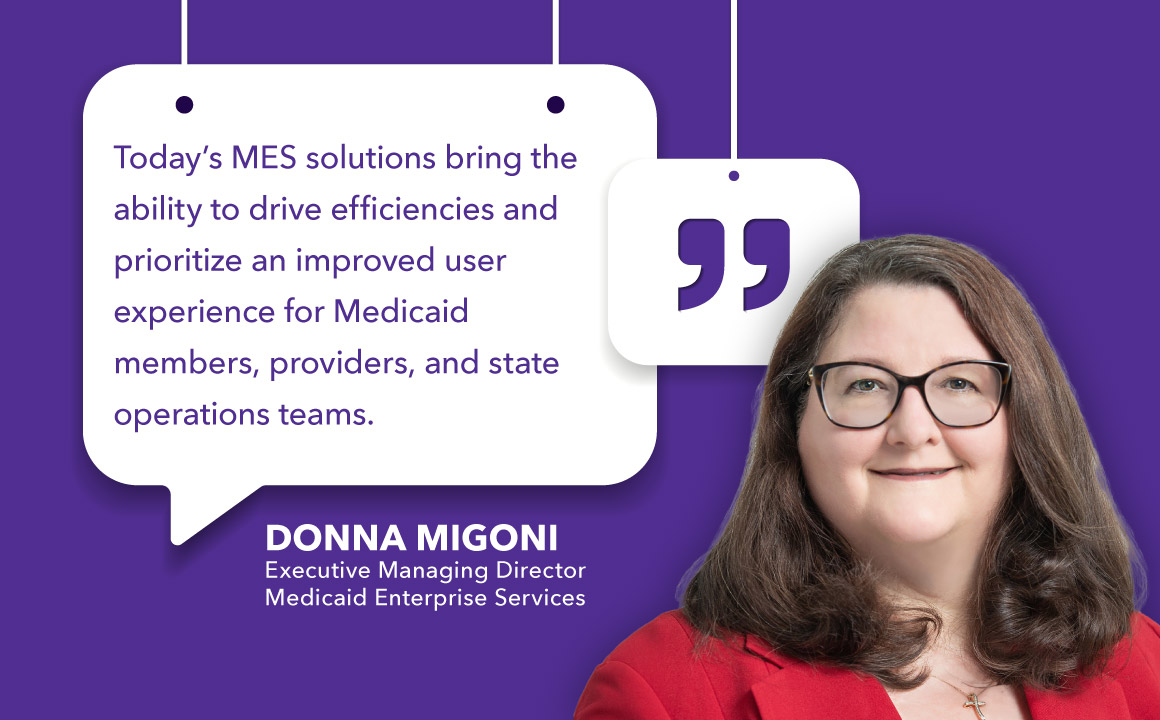Transform your traditional MMIS into modular, modern, and configurable capabilities
State Medicaid agencies can drive program efficiencies and improve member and provider experiences.

State Medicaid Management Information Systems (MMIS) were originally designed to automate administrative tasks and processes, improving efficiencies in Medicaid operations such as claims submission, adjudication, payment processing, and provider enrollment and financial functions. The MMIS also offered a portal framework for communications and transactional functions for providers, members, and state teams. This legacy MMIS model ran for decades on large, customized systems. While many core engines remain functional, the decades of customizations and older architectures have led to inflexible coding and complex interdependencies that make modifications difficult. Simply put, yesterday’s solutions are no longer optimal for today’s Medicaid program needs.
In response to industry calls for greater flexibility and scalability, states are transitioning from traditional MMIS solutions to Medicaid Enterprise Systems (MES) modules, guided by the Centers for Medicare & Medicaid Services’ (CMS) Medicaid Information Technology Architecture (MITA) functional recommendations. This shift enables states to procure the best solutions and vendors for specific Medicaid functions — reducing implementation risks and program disruptions while gaining much-needed configurability.
With change, come some challenges
While some states are experiencing success in adopting modularity, others are encountering challenges with multi-vendor implementations, legacy data conversion, cross-vendor module functionality, and solutions that cannot fully incorporate program policies and business rules. These challenges have led to delays, project cancellations, or increased budgets and program risks.
For example, legacy MMIS core claims capabilities have evolved over decades, both technologically and in terms of program policy; however, much of the business logic is embedded in historical programming code. Although these core claims capabilities can support critical programs, the original complexity of the policies and business rules is often lost when associated subsystems are modularized. This issue is exacerbated by turnover among personnel, leading to a loss of institutional knowledge. The prevalence of commercial-off-the-shelf terminology further perpetuates the misconception that the old logic and policies are obsolete. New MES module vendors must understand and replicate these business rules and key program policies in their modules.
As some state Medicaid programs face implementation challenges reminiscent of those encountered during historical MMIS rollouts, they must also address the additional complexities around deploying separate modules. When states tackle multiple module implementations simultaneously, states must be prepared to manage numerous vendors, integrate multiple systems, and handle complex data transformations.

With change, come many benefits
Although these tasks can be challenging, there are benefits to glean from a modular approach. Modernization initiatives strengthen the capabilities of modular solutions, enabling Medicaid programs to derive actionable insights from data sources, adopt emerging technologies like artificial intelligence and machine learning, and make future modifications easier — reducing state risk and maintenance efforts.
To achieve these benefits, states should have a well-thought-out modernization roadmap to help alleviate the challenges of simultaneous module implementations. They should bring in additional support for vendor management and confirm that procured modules can fully incorporate program policies and business rules. In addition, states should ensure that procured modules satisfy all elements of the MITA, defined state and CMS certification outcomes, and CMS’ Seven Conditions for Enhanced Funding standards.
Equally important is having a strategic partner for modernization and module implementations. A partner that brings deep domain knowledge around Medicaid programs, policies, and systems, along with demonstrated MES experience, can provide dedicated oversight with a constant eye on program benefits and end-to-end functions. The right partner can manage the plan and integration points, provide quality assurance and risk mitigation strategies, and ensure the project’s success. By focusing on the goal, they can help states overcome challenges and realize their modularity and modernization vision.
